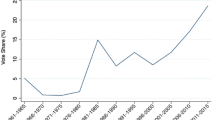Abstract
After the collapse of the command structures of the party-state in society and economy, it appeared that the integrative mechanisms as they are developing now in the post-socialist countries have a very limited cohesiveness in the sense that they can not easily support disequilibria and resist disruptions. The asynchronous collapse of old and developing of new integrative mechanisms created integrational vacuums at various levels. The dynamics of this process of conflicting time scales created additional problems of cohesion in each of the domains. It appeared that (dis)integration processes in politics and economics are closely interrelated. Marketization in itself offered enforced fragmentation rather than furthering cohesíon. The link between cohesion within Central and Eastern Europe and Europe at large is also discussed here.
Similar content being viewed by others
References
Anderson, B. (1983).Imagined Communities, reflections on the origin and spread of nationalism. Verso, London.
Cohen, J. and Arato. A. (1992).Civil Society and Political Theory. MIT Press, Cambridge.
Current Problems of Slovakia after the Split of the CSFR (1993), Centre for Social Analysis, Bratislava.
Economic Commission for Europe. (1993).Economic Bulletin for Europe. Volume 44 (1992). U.N., New York
Elias, N. (1987a).Die Gesellschaft der Individuen. SuhrkampTaschenbuch, Frankfurt (Main).
Elias, N. (1987b).Involvement and Detachment. Basil Blackwell, Oxford.
Hanson, Ph. (1993). Russia, economic reform and local politics.The World Today, April.
Hausner, J., Klementewicz,T.(ed.) (1992).The Protacted Death Agony of Real Socialism, Warsaw.
Lewis, P.G. (ed.). (1992).Democracy and Civil Society in Eastern Europe. MacMillan, Basingstoke.
Machonin, P.(1993).General Approaches to the Problems of Post-Communist Social Transformation. Institute of Sociology, Academy of Sciences of the Czech Republic.
New Democracies Barometer II. (1993). University of Strathclyde, Centre for the Study of Public Policy, Glasgow.
Oltay, E. (1993). Hungarian civic groups adjust to democracy.RFE Research Bulletin, Vol. 1, nr. 32, 14 August 1993
Overbeek, H. (1988).Global Capitalism and Britain's Decline, thesis, defended at the University of Amsterdam, January 1988.
Pickvance, C. (1992).The Transition from State Socialism: Towards New Local Power Structures. in Enyedi, Gy. (ed.) (1992). Social Transition and Urban Restructuring in Central Europe. Budapest.
Staniszkis, J. (1992). Contribution to the analysis of the corporative state emerging in Poland.Politicus, Institute of Political Studies, Polish Academy of Sciences.
Toffler, A. (1981).The Third Wave, Bantam Books, Toronto
Zon, H. van. (1992a).Alternative Scenarios for Central Europe. FAST Occasional Paper, nr. 226 rev. Commission of the EC, Brussels.
Zon, H. van. (1992b).Towards Regional Innovation Systems in Central Europe. FAST Occasional Papers, nr. 308. Commission of the EC, Brussels.
Zon, H. van. (1993).Problems of Transitology — Towards a New Research Agenda and a New Research Practice. Report written for the Euroreg Institute of the University of Warsaw and the Institute for Human Sciences in Vienna.
Author information
Authors and Affiliations
Rights and permissions
About this article
Cite this article
Von Zon, H. The lack of cohesion as the crucial problem for post-socialist societies. AI & Soc 8, 151–163 (1994). https://doi.org/10.1007/BF02064280
Issue Date:
DOI: https://doi.org/10.1007/BF02064280




